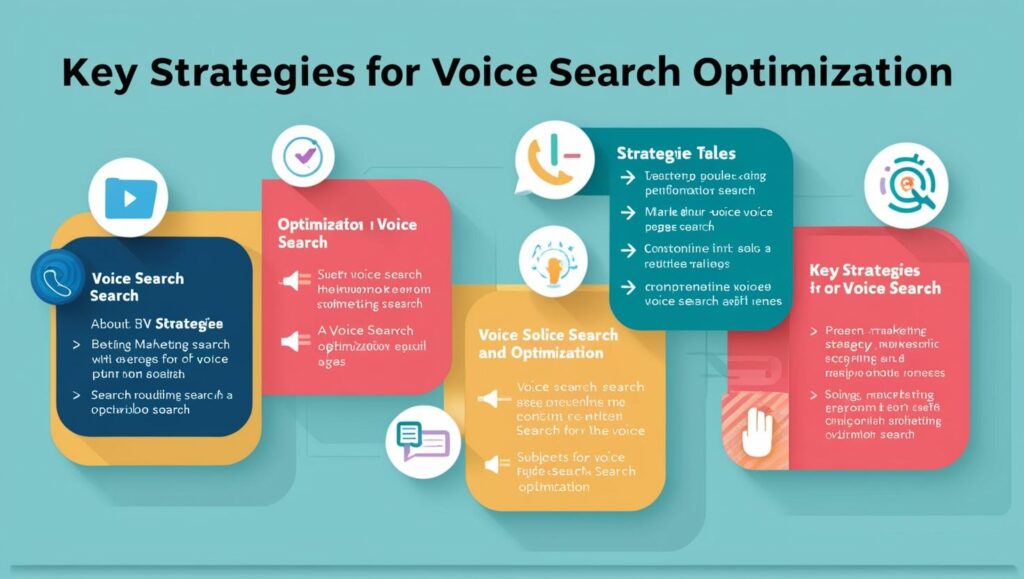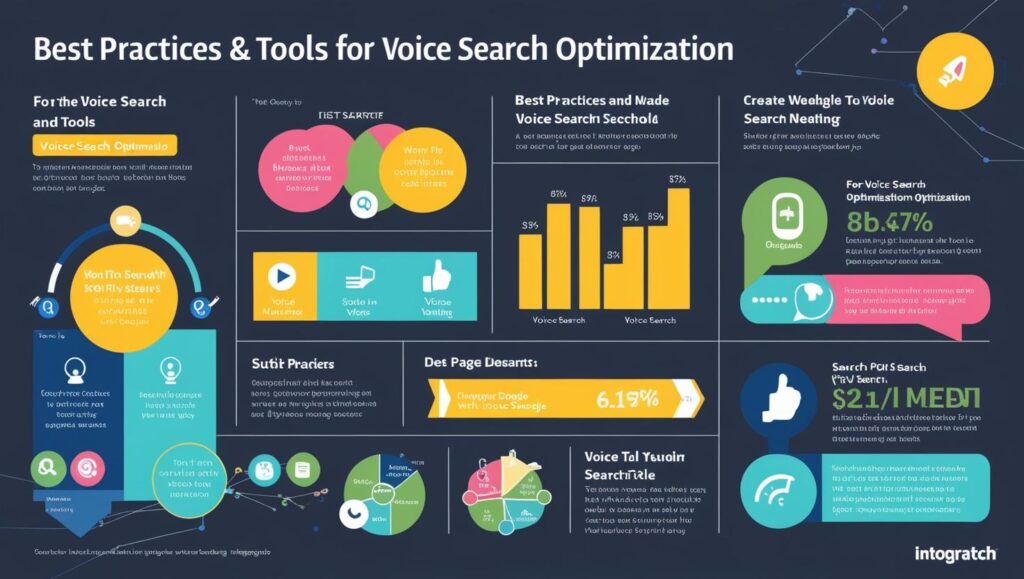Introduction
In an era where consumers increasingly interact with digital assistants like Siri, Alexa and Google Assistant, voice search has emerged as a game changer for digital marketing. As we look ahead to 2025, voice search optimization is not only a trend but a necessity for businesses seeking to improve online visibility and capture highly qualified traffic. In this comprehensive guide, we’ll explore what voice search optimization is, why it matters for 2025 and practical strategies you can implement right away.
What is Voice Search Optimization?

Voice search optimization is the process of enhancing your website and content so that it performs well when users conduct searches using voice commands. Unlike traditional text-based queries, voice searches tend to be more conversational, longer and often location-based. As a result, optimizing for voice search requires a slightly different approach, one that focuses on natural language and contextual queries.
Key aspects include:
–Natural Language Queries: Voice searches often resemble questions or full sentences rather than fragmented keywords.
–Local Intent: A significant percentage of voice searches are local, making it crucial for businesses with a physical presence to optimize for local SEO.
–Conversational Tone: The content must address the likely phrasing and tone of a spoken query.
Why Voice Search Optimization Matters in 2025
The digital landscape is evolving rapidly and voice search is at the forefront of that transformation. Here are some compelling reasons why optimizing for voice search is essential:
1. Growing Adoption of Smart Assistants:
With over a billion devices using digital assistants worldwide, the shift toward voice-based interactions is undeniable. Consumers increasingly rely on voice searches to get answers quickly and conveniently.
2. Changing User Behavior:
Studies and industry reports (as seen in recent trend analyses by platforms like TikTok and The Times) suggest that the way people search is becoming more conversational. This change means that websites optimized for voice search are more likely to capture this traffic.
3. Local Search Dominance:
Voice searches are highly localized. When a user asks, “Where can I find the best coffee shop near me?” a website that’s properly optimized for local voice search will have a competitive edge.
4. Improved Conversion Rates:
Since voice searches are usually performed by users with specific intent, ranking well for these queries can lead to higher conversion rates compared to traditional keyword searches.
Key Strategies for Voice Search Optimization

Implementing an effective voice search strategy involves several important steps. Below, we detail actionable strategies that you can begin using today:
1. Optimize for Conversational Keywords
Since voice searches are conversational, your keyword strategy should reflect natural language patterns. Use long-tail keywords and phrases that mimic how people speak. For example, instead of targeting “voice search optimization,” consider phrases such as “how do I optimize my website for voice search 2025?” or “what are the best voice search SEO tips?”
Action Step:
-Review your existing content and identify opportunities to include question-based phrases.
-Use tools like Google Trends and keyword planners to refine and test conversational queries.
2. Focus on Local SEO
A significant number of voice searches have local intent. Ensure that your business listings, local citations and Google My Business profile are fully optimized.
Action Step:
-Verify and update your business information across all local directories.
-Include location-specific keywords in your content (e.g., “best coffee shop in [City Name]”).
3. Create FAQ and Conversational Content
Developing a robust FAQ section or blog posts written in a Q&A format can greatly improve your chances of ranking for voice search queries. Address common questions your customers ask and provide clear, concise answers.
Action Step:
-Identify common customer queries using tools like AnswerThePublic.
-Develop FAQ pages and blog posts that answer these queries in a natural, conversational tone.
4. Improve Site Speed and Mobile-Friendliness
Voice searches are predominantly performed on mobile devices. A fast-loading, mobile-friendly website is crucial not only for user experience but also for higher rankings in search results.
Action Step:
-Use tools like Google’s Mobile-Friendly Test and PageSpeed Insights to optimize your website’s performance.
-Implement responsive design and reduce unnecessary page elements that slow down load times.
5. Utilize Structured Data Markup
Structured data (schema markup) helps search engines understand the context of your content better. This can increase your chances of appearing in rich snippets, which are especially valuable for voice search.
Action Step:
-Add FAQPage and LocalBusiness schema markup to relevant pages.
-Regularly audit your site’s structured data using tools like Google’s Structured Data Testing Tool.
Best Practices and Tools for Voice Search Optimization
To succeed in voice search optimization, you must integrate several best practices and leverage the right tools:

–Content Optimization:
Ensure that your content is clear, engaging and written in natural language. Use bullet points, subheadings and concise paragraphs to enhance readability.
–Mobile Optimization:
Focus on responsive design and fast-loading pages. Mobile-first indexing means that Google prioritizes your mobile version when ranking your site.
–Structured Data:
Implement structured data to help search engines understand your content. Use JSON-LD format for ease of integration and regular updates.
–Voice-Activated Tools:
Experiment with voice search testing tools such as AnswerThePublic and use voice query simulators to see how your site performs with natural language queries.
–Analytics and Monitoring:
Use Google Analytics, Google Search Console and specialized SEO tools like SEMrush to track performance improvements and adjust your strategy as needed.
How to Measure the Success of Your Voice Search Optimization
Measuring the effectiveness of your voice search strategy is essential for continuous improvement. Consider the following metrics:
–Organic Traffic:
Monitor changes in your organic traffic, especially for long-tail, conversational queries.
–Click-Through Rates (CTR):
Analyze the CTR of pages optimized for voice search. A higher CTR indicates that your snippet and meta description are effectively capturing attention.
–Local Search Rankings:
Track your position for local queries on both desktop and mobile.
–Engagement Metrics:
Look at bounce rates, time on page and pages per session to gauge if users find your content engaging and useful.
–Conversion Rates:
Ultimately, improved rankings and traffic should lead to higher conversion rates. Monitor your conversion funnels to identify any improvements or areas for further optimization.
The Future of Voice Search Optimization
As artificial intelligence and natural language processing continue to advance, voice search is set to become even more integral to digital marketing strategies. In 2025, expect:
–Greater emphasis on conversational content and semantic search: Marketers will need to continuously update content to reflect evolving speech patterns.
–Integration with emerging technologies: Wearables, smart home devices and IoT will further drive the need for fast, accurate voice search optimization.
–Enhanced personalization: AI will enable more precise targeting based on user behavior, location and search history, making voice search results even more tailored to individual needs.
Conclusion
Voice search optimization is poised to play a pivotal role in digital marketing in 2025. By understanding the nuances of conversational queries, focusing on local SEO and utilizing structured data, businesses can secure a competitive edge in the increasingly voice-driven search landscape. The strategies and best practices outlined in this guide provide a roadmap to adapt to this evolving trend and capitalize on the significant opportunities that voice search presents.
Now is the time to review your digital strategy, adjust your content and make sure your website is fully optimized for voice search. Embrace these strategies and get ready to capture the voice-driven traffic that will define the future of digital marketing.
At Balistro, we specialize in helping businesses grow through effective digital marketing strategies. From Google Ads to Meta Ads, we deliver data-driven campaigns that maximize your ROI and drive real results. If you’re looking to boost your online presence, generate leads, or scale your e-commerce business, our expert team is here to help. Contact us today to learn more about how we can support your advertising needs!



